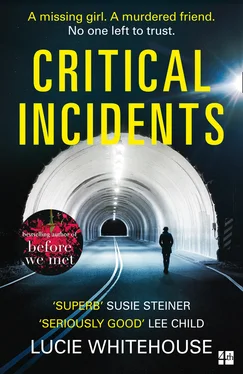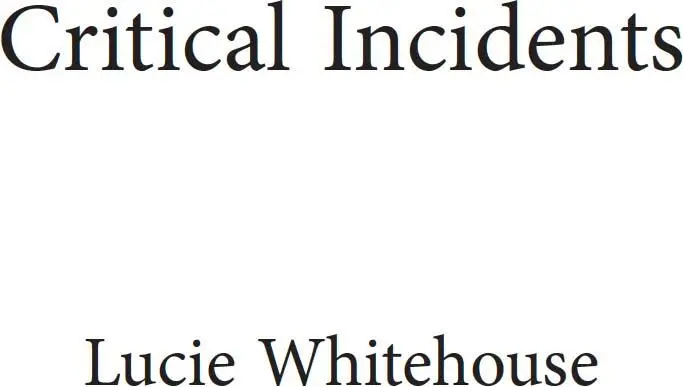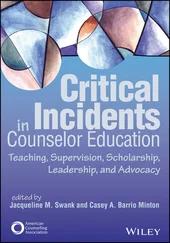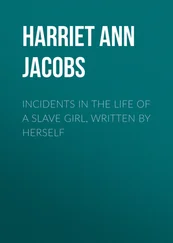
4th Estate
An imprint of HarperCollins Publishers
1 London Bridge Street
London SE1 9GF
www.4thEstate.co.uk
This eBook first published in Great Britain by 4th Estate in 2019
Copyright © Lucie Whitehouse 2019
Lucie Whitehouse asserts the moral right to be identified as the author of this work
A catalogue record for this book is available from the British Library
Cover photographs © Plain Picture (tunnel scene); © Shutterstock (figure)
Epigraph taken from The Less Deceived by Philip Larkin, by permission of Faber and Faber Ltd.
All rights reserved under International and Pan-American Copyright Conventions. By payment of the required fees, you have been granted the non-exclusive, non-transferable right to access and read the text of this e-book on-screen. No part of this text may be reproduced, transmitted, down-loaded, decompiled, reverse engineered, or stored in or introduced into any information storage and retrieval system, in any form or by any means, whether electronic or mechanical, now known or hereinafter invented, without the express written permission of HarperCollins
Source ISBN: 9780008269036
Ebook Edition © February 2018 ISBN: 9780008269012
Version: 2019-11-12
For Bridget
I leant far out, and squinnied for a sign
That this was still the town that had been ‘mine’
So long, but found I wasn’t even clear
Which side was which.
Philip Larkin
Contents
Cover
Title Page
Copyright
Dedication
Epigraph
Chapter One
Chapter Two
Chapter Three
Chapter Four
Chapter Five
Chapter Six
Chapter Seven
Chapter Eight
Chapter Nine
Chapter Ten
Chapter Eleven
Chapter Twelve
Chapter Thirteen
Chapter Fourteen
Chapter Fifteen
Chapter Sixteen
Chapter Seventeen
Chapter Eighteen
Chapter Nineteen
Chapter Twenty
Chapter Twenty-one
Chapter Twenty-two
Chapter Twenty-three
Chapter Twenty-four
Chapter Twenty-five
Chapter Twenty-six
Chapter Twenty-seven
Chapter Twenty-eight
Epilogue
Acknowledgements
About the Author
About the Publisher
Robin surveyed the table with its heap of crumpled napkins and burger boxes, stray fries and onion rings, the pile of bleeding ketchup packets. Aftermath of the cholesterol bomb. They’d had breakfast back in London, too, but as the road signs had started to portend BIRMINGHAM, her stomach started churning, and by the time they’d reached Warwick Services, it had felt completely empty or at least gnawing in some other way that made eating fifteen quid’s worth of Burger King seem like a good idea. Whoppers, milkshakes, the works – no section of the menu overlooked. Now she had stomach ache and she felt sick.
Across the table, Lennie’s stomach was a toddler-style pot under her Blondie T-shirt. She put her hands on it and grimaced. ‘Ugh. I feel like I’ve swallowed a sofa cushion. Full of grease.’
‘It was a two-seater. I got the fluff and loose change from down the back, too.’
Lennie laughed and for a moment, everything seemed brighter. There was still a chance this would all be irrelevant in the grand scheme, wasn’t there? A blip. Once, on one of the long nights when Lennie was a baby, she’d whispered in her ear that together, they could do anything. She would do anything for her, of course; but also, because of her, she, Robin, could do anything. Right , said a snide voice .
She stood quickly and began piling their rubbish onto the trays, crushing her burger box with a savagery that startled Lennie from her texting. ‘Once more unto the breach?’
A thump, hard but fleshy, as if a large bird – a pheasant, even a swan – had dropped from the sky and landed deadweight on the roof. They both jumped but a second later a smirking face loomed at the passenger-side window. For the love of god. Robin took a long breath then pressed the button to lower the glass.
‘Luke.’
Her own eyes looked back from a face that was her own, too, but pale and more defined, the jaw made square by pads of muscle. ‘Shocked you, did I? What are you doing sitting back here? There’s a parking spot outside.’
‘Someone must have just gone.’
Her brother made the yeah, right expression he’d been giving her since he was six. ‘How are you, Lennie? Can’t be many people who’ve staked out their own grandparents. Old habits dying hard, Rob?’
She flung the door open and moved to get out, remembering at the last second that she’d undone her jeans. ‘What are you doing here?’
‘Same as you – come to spend time with the rentals. Though just the afternoon in our case.’ He smirked again.
Robin came round to the pavement and stooped to look at the roof. She couldn’t see a dent, but still. ‘Why would you hit my car, you … fuckwit?’ she hissed.
‘Afraid it’ll affect the resale value? What?’ The injured innocence he did so well. ‘You’re going to have to sell it, aren’t you, if you’re as broke as Mum says? Can’t drive an Audi if you’re begging. Even if it was second-hand.’
‘We’re not begging.’ She glanced at Lennie, just getting out, then glared at him: Watch it .
‘Would you be back here if you weren’t?’
‘Hiya, Lennie. Robin.’ Natalie, Luke’s wife, lunged at them. She was like a newly hatched bird, Robin thought, all beak, eyes and pushy hunger, thrusting herself into the middle of every situation to ensure she wasn’t overlooked or slighted in some other unguessable way. Her fringe absorbed make-up from her forehead and hung in damp-looking, fresh-from-the-egg strands.
‘Right.’ Robin opened the boot. ‘Since you’re here, Luke, make yourself useful.’ She handed him a box. ‘It’s only light.’ She wasn’t going to give him an excuse to put his back out and malinger with his PlayStation for weeks. ‘Natalie, have you got a spare hand? It’s just a bag of—’
‘Sorry.’ She held up a set of lilac claws. ‘I’ve just had my nails done.’
On balance, Robin thought as she locked the car, Luke had done her a favour accosting her out here. Better to have the opening skirmish under her belt than walk into an ambush. And being pissed off was useful, armour of a sort. She’d thought she was over the worst but as she’d turned into Dunnington Road, she’d felt a moment of suffocating panic. Here it all was again, as if the sixteen years in between had just fallen away – collapsed: the pairs of Fifties semis facing off across the wide street, their bay windows netted prissily against anyone who could be bothered to peer over the rosebushes or the brace of mid-range saloons in the tiny front gardens. It was all so low-rise, so stunted: nothing reached higher than two storeys. The sky yawned overhead for bleak white acres, uninterrupted. She was seized by a sense of personal jeopardy, actual threat: if she was under it too long, exposed, it would suck out her soul.
As they rounded Terry Willett’s white Ford Transit – the bane of her mother’s existence, herself aside, for twenty-five years – she saw number 17 for the first time and waiting in the ground-floor bay, trapped like a bug between glass and net curtain, her dad. She watched him light up like he’d heard it was Christmas. In a whisk of nylon lace he was gone. ‘Chrissie,’ she imagined him bellowing, ‘they’re here!’
Читать дальше












